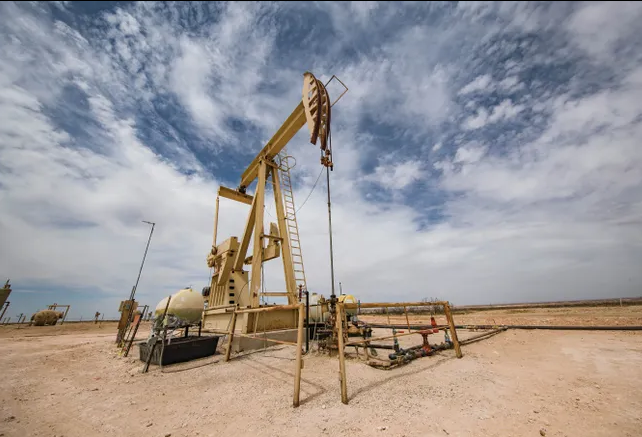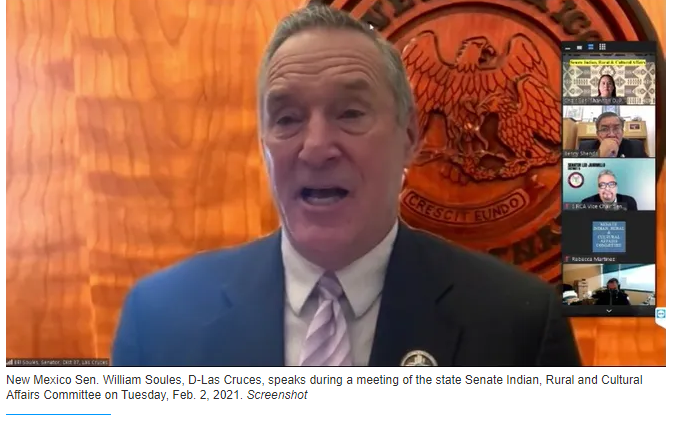Nuke waste site proposed near Carlsbad to place undue risk on New Mexicans, lawmakers say
Adrian Hedden Carlsbad Current-Argus
A desert landscape is pictured near the future site of the Holtec nuclear waste facility on Monday, April 12, 2021 in Lea County, New Mexico.
New Mexico lawmakers were concerned for the safety of storing spent nuclear fuel, in a year where Gov. Michelle Lujan Grisham called for a bill in the upcoming legislative session to ban such a facility within the state’s borders.
State Sen. William Soules (D-37) of Las Cruces said he was concerned that in the event of an incident at the Holtec site, local communities could bear the burden of cleanup.
His comments came during a Sept. 1 hearing of the Legislature’s Science, Technology and Telecommunications interim committee where lawmakers spoke with New Jersey-base Holtec International officials about the proposed site to be located near Carlsbad and Hobbs.
More:Nuclear waste shipments to repository near Carlsbad lagging behind goals for 2022
“All of the problems we’ve had with accidents with nuclear energy have been due to human error, due to hubris among people that nothing is going to happen, so we get lax with things,” Soules said. “This is dangerous stuff.”
Ed Mayer with Holtec International, said there was about $13 billion in surety bonds and federal funds to help pay for any incident at nuclear plants throughout the U.S. and that Holtec had “$100 million” in liability insurance.
Soules countered that this meant costs associated with problems at the Holtec site would be placed upon taxpayers, which he said was troubling and indicated the company did not have adequate liability for the project’s success.
More:Safety problems at New Mexico nuke lab could disrupt waste disposal at site near Carlsbad
“Then it’s all on someone else, and you get to some of hubris where people say, ‘It’s not on us,’ so you cut corners,” Soules said. “There have been similar concerns in other industries. Companies declare bankruptcy and walk away and leave all of the mess on the public.”
Mayer said there was a “billion to one” chance of an incident at the Holtec site if it was built and operated.
He said the consolidated interim storage (CIS) facility would not impact nearby oil and gas operations near its location in the Permian Basin – the U.S.’ most active fossil fuel region – and would pose no threats to underground water supplies or the surrounding environment.
More:New Mexico officials worry nuclear waste site proposed near Carlsbad could last forever
“We have little, if any, impact on the environment even if built out,” Mayer said. “We always say that safe and secure is our prime directive. That’s what we do.”
Holtec’s site would temporarily hold up to 100,000 metric tons of the high-level nuclear waste brought in from nuclear power generators via rail from around the country.
It would hold the waste at the surface, in silos extending about 40 feet deep, until a permanent repository was available.
More:New Mexico leaders demand limits on nuclear waste disposal at site near Carlsbad
Such a final resting place does not exist in the U.S., after a proposal to operate one at Yucca Mountain, Nevada was blocked.
That led Democrat New Mexico officials, including Lujan Grisham, her cabinet members, state lawmakers and congresspeople, to fear the Holtec site could become the “de-facto” permanent repository, putting an “unfair” risk on the people of New Mexico.
They were joined by a chorus of government watchdog and environmental groups from New Mexico and other states along potential transportation routes that alleged the facility amounted to “nuclear colonialism.”
More:Nuclear waste repository near Carlsbad works to improve underground airflow for workers
Opponents said the facility threatened to violate environmental justice by shifting waste and associated risks out of high-populated, wealthy areas like New York’s Hudson Valley into the rural, largely-minority-populated Chihuahuan Desert of New Mexico.
The federal Nuclear Regulatory Commission recommended issuing Holtec a license to build the facility, arguing environmental impacts were minimal, and a final safety review was expected to be completed by the agency in January, Mayer said.
The NRC did issue a license for a similar site in Andrews, Texas. That issuance was being litigated as Texas Gov. Greg Abbott, alongside state and federal lawmakers opposed the projects for its perceived risk to nearby oil and gas operations.
More:$3B contract to run nuclear waste site near Carlsbad delayed again amid protest from bidder
If it was completed and in service, Mayer said the site would represent a $3 billion capital investment in New Mexico, while providing hundreds of jobs to the region both in operations and manufacturing.
New Mexico Rep. Cathrynn Brown (R-55) of Carlsbad, a frequent supporter of the project, said she was convinced it would be safe.
“It’s in my opinion a very impressive design and the engineering will be truly spectacular for this,” she said. “I have comfort level with this personally.”
More:Western states join New Mexico in resisting nuclear waste storage without state consent
She asked Mayer to explain why the facility would be “interim” storage, meaning temporary, and to address concerns that the site could become a permanent resting place for the waste.
Mayer said that interim means the waste will be held for “two or three” decades at the site, but also told lawmakers the cannisters holding the waste could last 200 to 300 years in the “worst-case corrosive environment with no monitoring whatsoever.”
“By license, this is interim storage. It cannot be a permanent repository,” he said. “By law and by license, this cannot be a repository. But I caveat that these cannisters are remarkable robust and they’re going to last well beyond the requirements for this facility.”
Sen. Harold Pope (D-23) of Albuquerque said he had lingering concerns with the designed temporary nature of the facility, proposed ahead of a decision from the federal government as to how the waste would be permanently disposed.
“I almost feel like this is going to become permanent if those decisions are not made,” Pope said. “That’s really a concern of mine.”
Adrian Hedden can be reached at 575-628-5516, achedden@currentargus.com or @AdrianHedden on Twitter.


